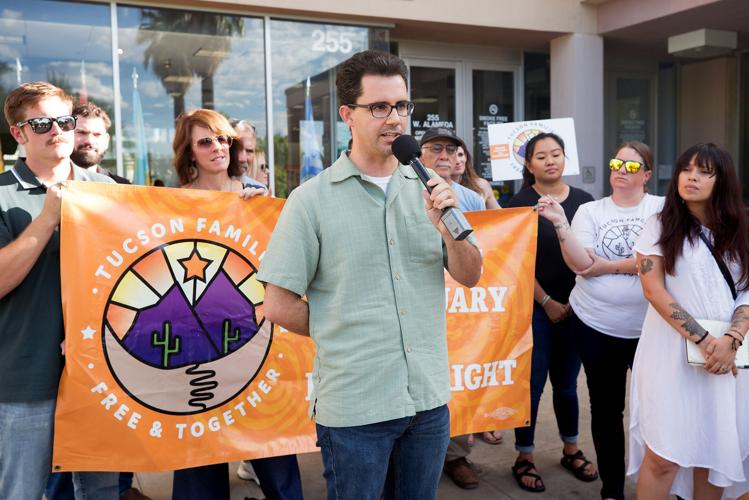A lawsuit challenging the legality of Tucson’s sanctuary-city initiative was dismissed by a judge Friday, allowing city voters to decide the matter at the polls in November.
“The Court has determined that Plaintiffs’ complaint fails as a matter of law,” Pima County Superior Court Judge Douglas Metcalf wrote in his ruling.
The lawsuit, filed by Tucson residents Benny White, Ann Hollis and Mike Ebert, challenged signatures used to get the initiative on the ballot, whether people paid to gather signatures, filled out forms correctly and argued that the minimum number of signatures required to get on the ballot — set by the city — is too low.
The judge’s decision was welcomed by organizers of the measure to declare Tucson a sanctuary city, which is officially called the Tucson Families Free & Together initiative.
The People’s Defense Initiative, a grassroots group formed last year, gathered more than 18,000 signatures to put the issue on the ballot, about twice as many as required.
“The court dismissed every single claim our opponents made. Every single one,” said Zaira Livier, campaign manager for the initiative. “The court did not throw out one single circulator’s affidavit or invalidate one single signature. This proves how organized we are and committed we are to making Tucson a sanctuary city.”
“Tucson will become the first jurisdiction in the entire country to become a sanctuary city as the result of a people-led, democratic initiative,” she predicted.
The Pima County Republican Party helped pay for the lawsuit.
On Friday afternoon, Pima County Republican Party Chairman David Eppihimer said the party is considering whether to appeal Metcalf’s decision.
“We are obviously disappointed,” said Eppihimer. “We will be meeting soon to discuss the possibility of an appeal.”
In July, Eppihimer said the county GOP was “saving Tucson from itself” in its attempt to derail the initiative.
He argued in part a state law should supersede Tucson’s guidelines for the minimum number of signatures, but Metcalf disagreed.
“The city followed its code and charter provision in calculating the number of qualified electors, it did not commit an error for which this Court can grant relief,” the judge wrote in a 12-page decision.
The head of the Pima County Democratic Party, Alison Jones, said the lawsuit was political maneuvering designed to keep voters from deciding whether Tucson should be a sanctuary city.
“The GOP’s desperate attempt to derail the sanctuary initiative is a direct assault on the democratic process,” said Jones. “Voters will support this initiative because they know that sanctuary cities have lower crime rates and are safer for all residents because folks, regardless of their status, are not afraid to report crimes.”
In February, the Pima County Democratic Party’s Executive Committee voted to endorse the initiative, also known as Prop. 205.
Officially, Tucson is an “immigrant-welcoming city” — a designation the City Council approved in 2012.
City officials routinely stress that the city has no policies or regulations that prohibit or limit the enforcement of federal immigration laws that are typically associated with sanctuary cities.
Supporters of the initiative say it puts the force of law behind many guidelines already in place here in Tucson that guide circumstances under which police officers can ask about immigration status.
The initiative would also add protections for some victims of crime and prohibit certain collaborations between city and federal agencies, among other measures.
There’s no universal definition of what constitutes a sanctuary city.
The National Immigrant Legal Resource Center, based in San Francisco, describes it as a place that limits how local law enforcement cooperates with federal immigration officers.





